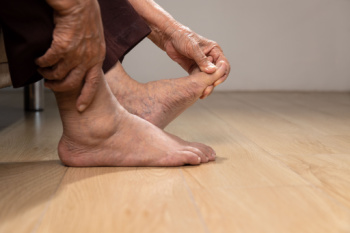 Gout is a form of arthritis characterized by sudden, severe attacks of pain, swelling, and redness in the joints. These symptoms often occur in the big toe. Treatment focuses on relieving pain during attacks and preventing future episodes. A podiatrist, or foot doctor, may recommend medications like nonsteroidal anti-inflammatory drugs, colchicine, or corticosteroids to reduce inflammation and pain during acute flare-ups. To manage gout long-term, changes in diet and lifestyle, such as reducing intake of high-purine foods, like red meat and seafood, increasing hydration, and maintaining a healthy weight, are important. A podiatrist can also suggest footwear designed to alleviate pressure on the affected joints, which may involve the use of orthotic devices for extra cushioning and support. Longer-term management techniques may involve the prescription of urate-lowering medications to decrease levels of uric acid in the blood. This helps to prevent the formation of urate crystals that cause gout symptoms. Regular follow-ups with a podiatrist are important to monitor gout symptoms and adjust treatment plans as needed. If you have gout, it is suggested that you consult with a podiatrist for targeted treatment.
Gout is a form of arthritis characterized by sudden, severe attacks of pain, swelling, and redness in the joints. These symptoms often occur in the big toe. Treatment focuses on relieving pain during attacks and preventing future episodes. A podiatrist, or foot doctor, may recommend medications like nonsteroidal anti-inflammatory drugs, colchicine, or corticosteroids to reduce inflammation and pain during acute flare-ups. To manage gout long-term, changes in diet and lifestyle, such as reducing intake of high-purine foods, like red meat and seafood, increasing hydration, and maintaining a healthy weight, are important. A podiatrist can also suggest footwear designed to alleviate pressure on the affected joints, which may involve the use of orthotic devices for extra cushioning and support. Longer-term management techniques may involve the prescription of urate-lowering medications to decrease levels of uric acid in the blood. This helps to prevent the formation of urate crystals that cause gout symptoms. Regular follow-ups with a podiatrist are important to monitor gout symptoms and adjust treatment plans as needed. If you have gout, it is suggested that you consult with a podiatrist for targeted treatment.
Gout is a painful condition that can be treated. If you are seeking treatment, contact Dr. Kevin Davis from Davis Foot & Ankle Centers. Our doctor will treat your foot and ankle needs.
What Is Gout?
Gout is a form of arthritis that is characterized by sudden, severe attacks of pain, redness, and tenderness in the joints. The condition usually affects the joint at the base of the big toe. A gout attack can occur at any random time, such as the middle of the night while you are asleep.
Symptoms
- Intense Joint Pain - Usually around the large joint of your big toe, and it most severe within the first four to twelve hours
- Lingering Discomfort - Joint discomfort may last from a few days to a few weeks
- Inflammation and Redness -Affected joints may become swollen, tender, warm and red
- Limited Range of Motion - May experience a decrease in joint mobility
Risk Factors
- Genetics - If family members have gout, you’re more likely to have it
- Medications - Diuretic medications can raise uric acid levels
- Gender/Age - Gout is more common in men until the age of 60. It is believed that estrogen protects women until that point
- Diet - Eating red meat and shellfish increases your risk
- Alcohol - Having more than two alcoholic drinks per day increases your risk
- Obesity - Obese people are at a higher risk for gout
Prior to visiting your podiatrist to receive treatment for gout, there are a few things you should do beforehand. If you have gout you should write down your symptoms--including when they started and how often you experience them, important medical information you may have, and any questions you may have. Writing down these three things will help your podiatrist in assessing your specific situation so that he or she may provide the best route of treatment for you.
If you have any questions, please feel free to contact our office located in Springfield, TN . We offer the newest diagnostic and treatment technologies for all your foot care needs.
